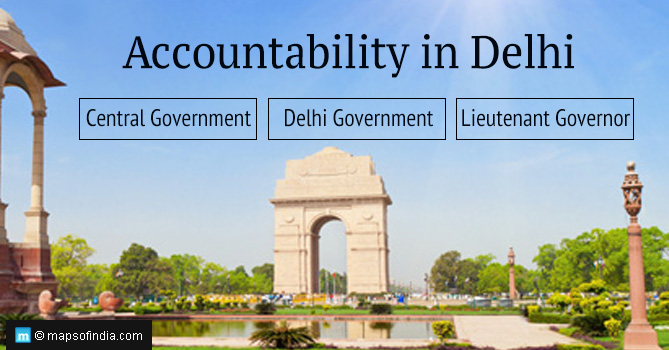Is Delhi a Union Territory? Is the national capital a state? These are questions that have often come up to intrigue us, not only as a matter of classification but also when it comes to define the role of the Lieutenant-Governor, the Chief Minister, and the state government.
The Legislative Assembly of Delhi was initially constituted in 1952 but by 1956, the assembly was abolished and Delhi resumed to be governed as a Union Territory. This means that like other Union Territories, Delhi was governed by an administrator who administers on behalf of the President of India.
On 1 February 1992, however, Article 239 of the Indian Constitution was amended and special provisions were made for Delhi which was formally declared to be the National Capital Territory (NCT). These provisions made way for the establishment of a unicameral legislature (which would be elected by the people). The NCT of Delhi would, like other states, have a Chief Minister (CM) and council of ministers. The constitutional head of Delhi, however, is the Lieutenant-Governor (LG), who is appointed by the President of India.
Article 239 on CM Vs LG
The very nature of the administrative set up in Delhi seems to give rise to a dispute between the CM (and the Council of Ministers) and the LG. Article 239AA clearly states that the Council of Ministers and the CM shall aid and advice the LG in his executive functions while the legislative assembly is to handle the lawmaking process.
It also says that in case of a difference between the LG and any minister (particularly with regard to the Chief Minister), the President’s decision shall be sought by the LG. If this is unavailable and the matter is an urgent one, the LG may use his discretion to take a decision and initiate action in the matter as he deems fit.
Over the past few years, the power tussle between the Delhi government and the office of the Lieutenant-Governor has been based on the interpretation of this article. The government claims that the LG is bound by the advice of the Council of Ministers, meaning that the governance of Delhi is the responsibility of the state government while the LG’s office claims that the ministers remain in an advisory capacity and the ultimate decision should be the LG’s.
Delhi’s Complex System Of Administration
The lack of clarity and the power struggle between the state government and the LG came into sharp focus ever since the Aam Admi Party (AAP) gained control of the state legislative assembly in 2013. Complicating matters further is the fact that the Delhi state government does not have authority of Delhi Police (law and order) which comes under the jurisdiction of the Ministry of Home Affairs of the central government. Land acquisition fall under the purview of the Chief Secretary of state, but all matters related to the Delhi Development Authority (DDA) goes to the LG who is also the chairman of DDA. The Delhi state government has power over the PWD, the Jal Board, power and transport, health and education but public health and sanitation falls under the Municipal Corporation of Delhi (MCD).
When we start to unravel the very complex system of administration in the capital, it becomes clear that not only is there a clear lack of accountability but also forms the basis of much of the political blame game.
Supreme Court Intervenes
The ongoing legal battle to determine the nature of administrative powers of the Delhi government and the LG has been taken up both at the High Court and at the Supreme Court levels.
Last month, a five member bench of the Supreme Court of India said that the Lieutenant-Governor of Delhi has more power than the governor of a state. He may exercise his discretionary powers and does not have to act on the advice of the Council of Ministers at all times. Subsequently, the Central Government accused the AAP led Delhi government of raking up a controversy to shift the blame and not accept its responsibility. The AAP government cannot claim the powers and privileges of other state governments, said the center to the Supreme Court.
While the Central Government and Delhi government and the LG of Delhi remain mired in a battle that has no easy solutions, the people of Delhi continue to suffer the fallouts of the logjam. The Deputy Chief Minister of Delhi, Manish Sisodia claimed that the Lieutenant Governor of Delhi, Anil Baijal, has rejected the government’s proposal to deliver essential services such as birth and death certificates, driving license, pensions and water connections, registrations etc. to the doorsteps of the people of Delhi.






